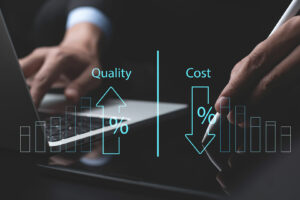
As we move into 2024, the supply chain landscape is undergoing a transformative shift, with supplier management at the forefront of this change.
This evolution is not just about keeping up with trends; it’s about reshaping how businesses operate across all industry sectors.
Here’s a comprehensive overview of the key trends that are set to redefine supplier management:
Digital Transformation and Supplier Integration
The push towards digitalisation in supply chains is inevitable. Blockchain, AI, and IoT are optimising operations and revolutionising supplier management. These tools enable better end-to-end visibility and predictive analytics, facilitating deeper supplier performance and risk assessment insights. Digital platforms are crucial for maintaining dynamic supplier relationships, ensuring compliance, and streamlining communication.
Sustainable Supplier Practices
Sustainability is transitioning from a buzzword to a business imperative.
In 2024, responsibly managing a supply chain will ensure suppliers adhere to eco-friendly practices. This goes beyond compliance; it’s about embedding sustainability into the core of supplier management strategies. Companies will increasingly assess suppliers based on their carbon footprint and environmental impact, making sustainability a key criterion in supplier selection and evaluation.
Building Resilience with Diverse Suppliers
The recent disruptions have highlighted the need for resilient supply chains. A critical aspect of this resilience is diversifying the supplier base. Companies are now looking to expand their supplier networks, including local and alternative sources, to mitigate risks from unforeseen events. Effective supplier management in 2024 will involve robust contingency planning and dynamic risk assessment strategies.
Leveraging Analytics in Supplier Decisions
Advanced analytics and predictive modelling are becoming integral to supplier management. The focus will be on harnessing data for better decision-making regarding supplier selection, performance monitoring, and risk management. Real-time data insights will empower businesses to identify potential supplier-related issues before they escalate, enhancing overall supply chain agility.
Collaborative Supplier Relationships for Enhanced Visibility
Achieving end-to-end supply chain visibility is critical. This includes having a transparent view of the supplier network. Collaborative relationships, fostered through integrated platforms, are essential for effective supplier management. These relationships enable better coordination and quicker response to any supply chain disruptions.
Generative AI for Strategic Supplier Insights
Generative AI is set to offer new avenues in supplier management by providing comprehensive insights into the supply chain ecosystem. This AI subset can refine analysis over time, aiding strategic supplier decisions and operational efficiencies.
AI-Driven Supplier Planning
AI is transforming supply chain planning, extending to supplier management. AI-enabled applications will assist in bridging the gap between planning and execution, offering insights for better supplier coordination and responsiveness.
Data-Driven Supplier Management
Efficient management of supplier data is becoming increasingly important. A focused data quality and consistency approach will help make informed decisions about suppliers and enhance operations.
Transparency Beyond Primary Supplier
Visibility into the deeper supply chain layers, including secondary and tertiary suppliers, is gaining importance. This transparency is crucial for risk management and regulatory compliance.
Low-Code Platforms for Agile Supplier Management
Adopting low-code platforms will simplify integrating various systems within the supplier network. These platforms allow for quick adaptation to changes in supplier dynamics.
Focusing on Scope 3 Emissions in Supplier Selection
The emphasis on Scope 3 emissions necessitates a closer look at the environmental impact of the entire supplier network. Companies will need to assess suppliers based on their carbon footprint and sustainability practices.
Electric Vehicles and Sustainable Logistics
The shift towards electric and autonomous vehicles in logistics will influence supplier management. Suppliers that align with these sustainable logistics practices will be preferred.
Adapting to The Digital Marketplace’s Demands
The rise of e-commerce is transforming supplier management strategies. Businesses will need to ensure that their suppliers can meet the demands of the digital marketplace, including aspects like timely delivery, inventory management, and adaptability to changing consumer preferences.
Robotics and Automation in Supplier Processes
The integration of robotics and automation also extends to suppliers. Suppliers embracing these technologies can offer more efficient and cost-effective solutions. Supplier management strategies must include assessments of technological capabilities, focusing on suppliers who can provide automated solutions for manufacturing and distribution.
In conclusion, the supply chain trends for 2024 point towards an era of more integrated, resilient, and sustainable supplier management.
Leveraging advanced technologies and data-driven strategies is essential for navigating these trends effectively.
Platforms like SourceDogg provide invaluable support for businesses to adapt and stay competitive in this evolving market landscape. SourceDogg offers a cloud SaaS supplier management solution that aligns with these emerging trends, helping companies harness the power of digital transformation, data analytics, AI and sustainable practices in supplier management.
We help companies streamline their operations, gain a competitive edge and emerge as leaders in the new age of supply chain management.




